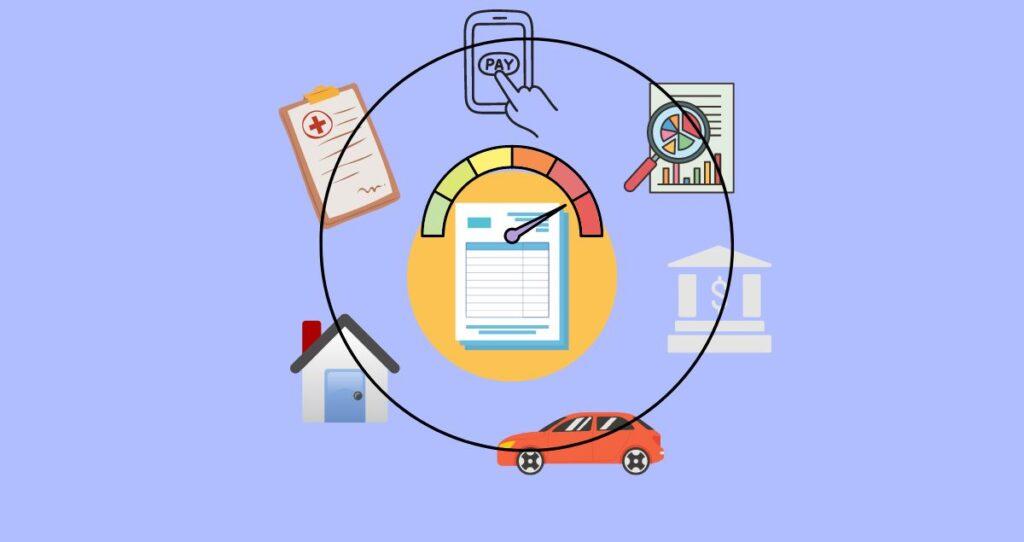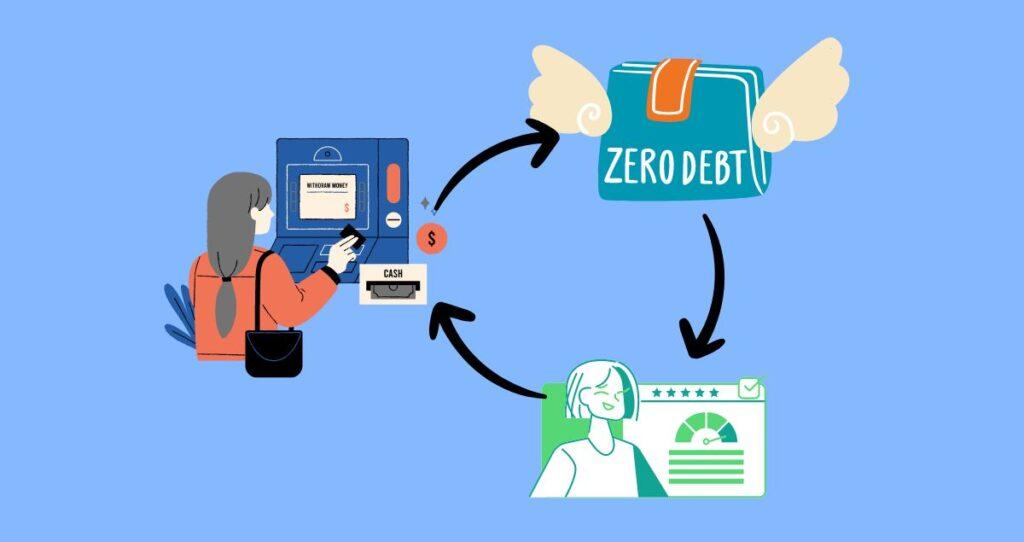Negative information on your credit report affects the health of your credit and lowers your credit score. Having negative information on your report can also affect your ability to qualify for loans and make it harder to repair your credit.
By understanding how long information stays on your credit report, you can make educated decisions on how to move forward in rebuilding your credit. Some information stays on your credit report longer than others. More importantly, each negative item on your credit report affects your credit score differently. By default, the negative information stays on your credit report for 7 to 10 years.
For example, a bankruptcy on your credit report will affect your credit score differently than a charge-off account. In addition, a bankruptcy can stay on your credit report for up to 10 years but a charge-off will stay on your credit report for 7 years.
In this article, we will explore how long common negative information stays on your credit reports and how they affect your credit score.
Without further ado, let’s jump right into it.
What is a negative item/ negative information on your credit report?
A negative item on your credit report is information that is undesirable to lenders. Think of something your lender can read and say, “Ahhh, I don’t think you are a good candidate for our money”. Negative information on your credit report shows a past struggle with your credit accounts which is considered to be a red light in the lending industry.
The information on your credit report can include late payments on your loans and credit accounts, bankruptcies, foreclosures, short sales, etc. Negative information stays on your credit report for many years. Usually, you should expect the information to remain on your credit report anywhere between 7 to 10 years.
How long does the information stay on your credit report?
Generally speaking, the information stays on your credit report for 7 years or more. But, the range is usually 7 to 10 years depending on the information.
Negative items on your credit report directly affect how long it takes to improve your credit after paying off your debt. Any bad information that shows your past struggle with credit accounts is considered a negative item.
Maybe you did not pay your bills on time, you failed to fulfill your account terms, or simply stopped paying and defaulted on your loan. All this information sends a mixed signal to lenders when you are applying for loans and affects the health of your credit.
Common negative information on your credit report
The following is a list of common negative items on your credit reports.
1. Late payments
Paying off your bills on time is probably the most important decision you will make with your credit accounts. Not paying off your debt on time affects your credit and that sucks when you are trying to apply for a loan. The idea is that if you cannot pay off your loans as agreed, you are automatically a risky borrower. Late payments drop your credit score and remain on your credit report for many years.
Usually, your lender will report your payment as a late payment after it is 30 days past due. Late payment information will stay on your credit reports for 7 years. Once a late payment is reported on your credit report, your credit score will tank by as many as 180 points.
Related post: How Late Payments Affect Your Credit Score?
2. Delinquent account
Any accounts that are reported to major bureaus after 30 days past due are delinquent and will stay on your credit report for 7 years. According to Experian, the more days your account stays in delinquency, the more it will affect your credit score.
3. Accounts that were sent to collections
Being in the collection means that you missed many payments and your lender decided to send your accounts to a debt collector or sold them to a debt buyer. A collector can be an individual or an agency. Collection accounts will stay on your credit reports for 7 years.
4. Charge-offs
A charge-off happens when your lender writes your account as a loss. After your account is deemed as a charge-off, no future charges are credited to the account. Keep in mind that you are still liable for your debt and things can get uglier the longer you wait.
That is your lender can sell your debt to a debt buyer or send your accounts to a collection agency.
5. Bankruptcies
Bankruptcy is the biggest negative information on your credit report and it affects your credit score the most. Yes, other information on your credit report affect your credit score too but bankruptcy is worse.
Bankruptcy information stays on your credit report for up to 10 years depending on the type of bankruptcy you filed. In addition, bankruptcy can lower your credit score anywhere between 130 to 240 according to Debt.org. The higher your credit score is, the greater the damage from bankruptcy.
6. Foreclosures
Foreclosure is a process where your creditor legally takes the property from you and sells it in the auction. This happens when you default on your mortgage and fail to make payments for many months. Usually, a foreclosure is initiated after 120 days of missing payments.
A foreclosure stays on your credit report for 7 years and lowers your credit score by as much as 160 points according to Consumer Education Services. As time goes by, the effect of foreclosure on your credit score will fade away.
7. Hard inquiries
Hard inquiries are common information that gets reported on your credit reports. A hard inquiry will appear on your credit reports when you apply for credit and your lender requests to view your credit profile. Each hard inquiry lowers your credit score between 2 to 10 points. But losing 5 to 6 points is more common.
Hard inquiries stay on your credit report for 24 months. After 2 years, a hard inquiry will automatically fall off your credit reports. If a hard inquiry did not fall off your credit report after 24 months, you can dispute it to major credit bureaus(Equifax, TransUnion, and Experian), your lender, or both.
Your dispute letter should have all information necessary that proves the inquiry has been there longer than it should have.
8. Short sales
Being a homeowner means that you are subjected to the risk of a short sale. A short sale happens when you can no longer afford to pay off your mortgage and the lender allows you to sell the property for less than you owe. In this case, your lender such as a bank will be the one deciding the sales price.
After the property is sold, you might be liable for the remaining balance.
A short sale will show up on your credit reports as “not paid as agreed”. More importantly, short sale information will remain on your credit report for 7 years. According to Incharge.org, a short sale will lower your credit score between 100 and 150 points.
9. Deed-in-lieu of foreclosures
A deed-in-lieu foreclosure happens when you voluntarily turn over the property to your lender to avoid foreclosure. According to Rocket Mortgage, a deed-in-lieu of foreclosure stays on your credit report for 4 years.
10. Unpaid judgment against you
If you have an unpaid judgment on your credit report, you should expect it to stay on your credit report for 7 years. But, it might be removed when your statute of limitation is over whichever is longer.
11. Medical Bills
Medical bills get removed from your credit report as soon as they are paid off. According to NerdWallet, Starting in 2022 all major credit reporting agencies(Equifax, TransUnion, and Experian) started removing medical bills from credit reports after the medical debt is paid off. But, if the debt is not paid off, it can be sent to the collection which will have the same impact as any other collection account.
12. Vehicle repossessions /car repos
If you have a car loan and fall behind on your payment, the lender might take possession of the car. This might happen with or without a warning but your contract should convert the terms that govern this issue. Car repossession stays on your credit report for 7 years. According to CapitalOne, vehicle repossession on your credit report can lower your credit score by 100 points or more.
How to remove information from your credit report?
To remove information from your credit report, you will need to submit a formal dispute letter to your lender and major credit agencies that reported the information. Removing negative items from your credit reports is essential when fixing your credit.
Usually, the process of removing information from your credit report is simple. But, things can be difficult especially when you are trying to remove an item that is valid. Easy information to remove from your reports can be an overdue hard inquiry. If you have a hard inquiry that stayed on your credit report for more than 24 months, you can easily dispute it to your creditor, credit reporting agencies, and both.
Your dispute letter should include all relevant information and proof you have related to the item you are trying to remove. For example, you can attach payment receipts and confirmation of your payments to your letter. You can also attach the date the inquiry was first reported together with supporting documents.
Where to dispute information in your credit report?
The information in your credit report should be disputed to either credit bureaus that reported it, your creditors, or both. A formal dispute letter should be submitted to each bureau and each lender that reported the information to credit bureaus.
Some information is harder to dispute than others. For example, having a bankruptcy deleted from your credit reports can be a bit tricky. This is because there are a lot of third parties involved in your bankruptcy case such as the bankruptcy court, credit bureaus, lenders, etc. All these people might need to be contacted in the process of verifying the bankruptcy in question. As a result, it might take longer to have everything completed.
Major credit reporting bureaus’ contact information
The following is the list of major credit reporting bureaus and their contact information you can use to dispute information in your credit report.
- Equifax
- Dispute online: Dispute negative items in your credit report online from the Equifax website.
- By phone: 1-(866)-349-5191 or use the number listed on your report
- By mail: You will need to download the dispute form and mail it together with your letter explaining the nature of your dispute. Use the following mailing address:
- Equifax Information Services LLC
- P.O. Box 740256
- Atlanta, GA 30348
- TransUnion
- Dispute errors online: Dispute negative items on your credit report from the TransUnion website
- By phone: 1-(800)-916-8800. You can also use the number provided in your credit report.
- By mail: If you choose the mail option, make sure that you download the dispute form for TransUnion and mail your form and dispute letter to the following address.
- TransUnion LLC
- Consumer Dispute Center
- P.O. Box 2000
- Chester, PA 19016
- Experian
- Dispute online: Dispute information from your credit report online from the Experian website.
- By phone: 1-(888)-397-3742 or use the number provided on your report
- By mail: If you choose to dispute information on your credit report online, you will need to download the Experian dispute form and submit it together with your dispute letter and other supporting documents to the following mailing address.
- P.O. Box 4500
- Allen, TX 75013
For more details on how to dispute negative items in your credit report, use the following guide.
Can I dispute every negative item on my credit report?
Although you can dispute every error and negative item in your credit report, it always does not guarantee success. If a negative item was reported on your credit report and can be verified to be true, you might not be able to dispute it.
For example, an account in the collection might not be disputed if it was accurately reported. That is if in fact you did not pay your debt and your lender sent your account in collection, it will be harder to have the collection account removed from your credit report.
A trick way to delete such an account is to negotiate with your lender and the collection agency for the removal of the negative information. That is you might agree to pay off the remaining balance on the account in question in exchange for the removal of the account from your credit report. If this agreement goes through, you should get a confirmation in writing before you pay off that loan.
Keep in mind that many lenders might not agree with this setup. But, it does not hurt to try.
Does paying off a collection account remove it from my credit report?
Paying off a collection account does not directly remove it from your credit report. Although the balance will become zero when the collection account is paid off, the account will still show on your credit report for 7 years. To get the account off your credit report early try the pay-for-delete method.
Negotiating the removal of the account before paying it off is the best way to approach this process. Once the account is paid off, will have nothing to bargain with.









